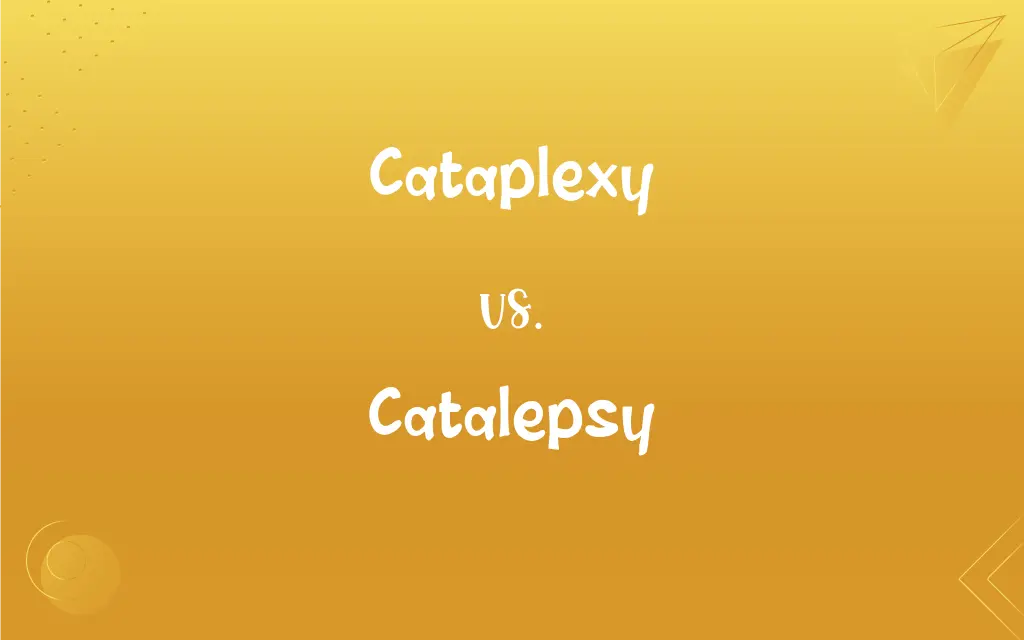Cataplexy vs. Catalepsy: What's the Difference?
Edited by Harlon Moss || By Janet White || Updated on October 11, 2023
Cataplexy is a sudden muscle weakness triggered by emotions, often linked with narcolepsy, while Catalepsy involves rigid muscles and a lack of response to external stimuli, often seen in psychiatric disorders.

Key Differences
Cataplexy is a condition closely associated with narcolepsy, a sleep disorder. It manifests as sudden, temporary muscle weakness or paralysis that's typically triggered by strong emotions such as laughter, anger, or surprise. The episodes can last from a few seconds to several minutes. On the contrary, Catalepsy is a term that denotes a state where an individual experiences muscle rigidity and remains in a fixed position for an extended period. This condition can be unresponsive to external stimuli, making it appear as if the person is in a trance or frozen state.
Another significant distinction between Cataplexy and Catalepsy is their root causes and associated conditions. While Cataplexy is predominantly linked to narcolepsy, Catalepsy is more commonly associated with certain psychiatric disorders, including schizophrenia and catatonic disorders. Additionally, some drugs or medical conditions can induce cataleptic states.
From a symptomatic standpoint, a person experiencing Cataplexy remains conscious during an episode, even if they can't speak or move. They are aware of their surroundings and can recall the events post-episode. In contrast, during a Catalepsy episode, the individual may not be conscious or aware, and the rigidity can be so profound that even painful stimuli might not provoke a reaction.
Both Cataplexy and Catalepsy are medical conditions that require proper diagnosis and management. While they might seem similar due to their association with muscle symptoms, understanding their distinct features, causes, and treatments is crucial for healthcare professionals and patients.
Comparison Chart
Definition
Sudden muscle weakness due to emotions
Muscle rigidity & unresponsiveness
ADVERTISEMENT
Associated With
Narcolepsy
Psychiatric disorders
Duration
Seconds to minutes
Can be extended
Consciousness
Maintained during episode
Might be absent
Trigger
Strong emotions (e.g., laughter)
Various, including drugs or mental disorders
Cataplexy and Catalepsy Definitions
Cataplexy
A sudden, brief loss of voluntary muscle tone triggered by emotional stimuli.
She experienced cataplexy and collapsed upon hearing the hilarious joke.
ADVERTISEMENT
Catalepsy
Often associated with schizophrenia and certain other psychiatric disorders.
Catalepsy is one of the symptoms often noted in catatonic schizophrenia.
Cataplexy
A symptom often seen in narcoleptic patients.
Cataplexy is one of the telltale signs of narcolepsy.
Catalepsy
A medical condition characterized by extended rigidity and fixity of posture.
The patient's catalepsy made him appear as a statue.
Cataplexy
A condition resulting from an atypical response in the brain to strong emotions.
Due to his cataplexy, he avoids watching emotional movies in public.
Catalepsy
A trance-like state with a loss of voluntary motion and decreased sensitivity to pain.
She was in such deep catalepsy that she didn't respond to any stimuli.
Cataplexy
An episode that can range from a slackening of the facial muscles to a complete physical collapse.
The cataplexy caused her face to droop momentarily.
Catalepsy
A state where muscles are fixed in a single position, often seen after seizures.
After the seizure, he remained in catalepsy for several minutes.
Cataplexy
A transient episode where one remains conscious but may be immobile or weak.
His cataplexy was so severe that he couldn't speak during the episode.
Catalepsy
A symptom induced by certain drugs or hypnosis.
The drug-induced catalepsy made her unresponsive to her surroundings.
Cataplexy
A sudden loss of muscle tone and strength, usually caused by an extreme emotional stimulus.
Catalepsy
A condition characterized by lack of response to external stimuli and by muscular rigidity, so that the limbs remain where they are positioned. It occurs in a variety of physical and psychological disorders, such as epilepsy and schizophrenia, and can be induced by hypnosis.
Cataplexy
(medicine) An abrupt loss of muscle tone, sometimes associated with narcolepsy.
Catalepsy
(pathology) A severe bodily condition, described in psychiatric pathology, marked by sudden rigidity, fixation of posture, and loss of contact with environmental conditions.
Cataplexy
A morbid condition caused by an overwhelming shock or extreme fear and marked by rigidity of the muscles.
Catalepsy
A sudden suspension of sensation and volition, the body and limbs preserving the position that may be given them, while the action of the heart and lungs continues.
Catalepsy
A trancelike state with loss of voluntary motion and failure to react to stimuli
FAQs
What triggers Cataplexy?
Strong emotions like laughter, anger, or surprise.
How long does a Cataplexy episode last?
From a few seconds to several minutes.
Can you wake someone from a Catalepsy state?
They might not respond to external stimuli, including painful ones.
Is Catalepsy a form of paralysis?
It's a state of rigidity and unresponsiveness, not typical paralysis.
Is Catalepsy always associated with psychiatric disorders?
Not always; drugs or other medical conditions can induce it.
What causes Catalepsy?
Psychiatric disorders, drugs, and certain medical conditions.
Can you treat Cataplexy?
Yes, with lifestyle adjustments and medications.
Is Catalepsy a type of seizure?
No, but it can follow certain types of seizures.
Can Cataplexy be dangerous?
It can be if it occurs during activities like driving or standing.
Is Cataplexy hereditary?
There may be a genetic component, but the exact cause is unknown.
How is Catalepsy diagnosed?
Based on clinical observation and ruling out other medical conditions.
Can stress induce Catalepsy?
It's not a common trigger like it is for Cataplexy.
Is Cataplexy common in all narcolepsy patients?
Many, but not all, narcoleptic patients experience cataplexy.
Is Catalepsy a lifelong condition?
It depends on its cause but can often be managed with treatment.
What's the main difference between Cataplexy and Catalepsy?
Cataplexy involves muscle weakness, while Catalepsy involves rigidity.
Can emotions trigger Catalepsy?
Typically, no, but it's a common trigger for Cataplexy.
Can Catalepsy be seen in animals?
Yes, certain animals can display cataleptic behaviors.
Are Cataplexy and Catalepsy related?
They are distinct conditions but both involve muscle symptoms.
Is there a cure for Cataplexy?
No cure, but symptoms can be managed.
How is Cataplexy different from a fainting spell?
In Cataplexy, consciousness is maintained; in fainting, it's lost.
About Author
Written by
Janet WhiteJanet White has been an esteemed writer and blogger for Difference Wiki. Holding a Master's degree in Science and Medical Journalism from the prestigious Boston University, she has consistently demonstrated her expertise and passion for her field. When she's not immersed in her work, Janet relishes her time exercising, delving into a good book, and cherishing moments with friends and family.
Edited by
Harlon MossHarlon is a seasoned quality moderator and accomplished content writer for Difference Wiki. An alumnus of the prestigious University of California, he earned his degree in Computer Science. Leveraging his academic background, Harlon brings a meticulous and informed perspective to his work, ensuring content accuracy and excellence.
































































